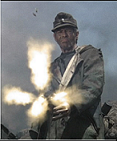Capt. Harlock
Posts: 5358
Joined: 9/15/2001
From: Los Angeles
Status: offline

|
quote:
Lincoln was brilliant, just brilliant. He could not be accused of withholding troops from McClellan, but at the same time he covered his own butt if Washington fell.
Along those lines, Lincoln also had to steer a middle course between the staunch abolitionists and the slave-holders still loyal to the Union. 150 Years Ago Today, he made his response to General David Hunter's emancipation (but conscription) of blacks in his area of command:
Washington this nineteenth day of May,
in the year of our Lord one thousand eight hundred and sixty-two
By the President of the United States of America.
A Proclamation.
Whereas there appears in the public prints, what purports to be a proclamation, of Major General Hunter, in the words and figures following, to wit:
Head Quarters Department of the South,
Hilton Head, S.C. May 9, 1862.
General Orders No 11.–The three States of Georgia, Florida and South Carolina, comprising the military department of the south, having deliberately declared themselves no longer under the protection of the United States of America, and having taken up arms against the said United States, it becomes a military necessity to declare them under martial law. This was accordingly done on the 25th day of April, 1862. Slavery and martial law in a free country are altogether incompatible; the persons in these three States–Georgia, Florida and South Carolina–heretofore held as slaves, are therefore declared forever free.
(Official) David Hunter,
Major General Commanding.
And whereas the same is producing some excitement, and misunderstanding; therefore
I, Abraham Lincoln, President of the United States, proclaim and declare, that the government of the United States, had no knowledge, information, or belief, of an intention on the part of General Hunter to issue such a proclamation; nor has it yet, any authentic information that the document is genuine– And further, that neither General Hunter, nor any other commander, or person, has been authorized by the Government of the United States, to make proclamations declaring the slaves of any State free; and that the supposed proclamation, now in question, whether genuine or false, is altogether void, so far as respects such declaration.
I further make known that whether it be competent for me, as Commander-in-Chief of the Army and Navy, to declare the slaves of any State or States, free, and whether at any time, in any case, it shall have become a necessity indispensable to the maintenance of the government, to exercise such supposed power, are questions which, under my responsibility, I reserve to myself, and which I cannot feel justified in leaving to the decision of commanders in the field. These are totally different questions from those of police regulations in armies and camps.
On the sixth day of March last, by a special message, I recommended to Congress the adoption of a joint resolution to be substantially as follows:
Resolved, That the United States ought to co-operate with any State which may adopt a gradual abolishment of slavery, giving to such State pecuniary aid, to be used by such State in its discretion, to compensate for the inconveniences, public and private, produced by such change of system.
The resolution, in the language above quoted, was adopted by large majorities in both branches of Congress, and now stands an authentic, definite, and solemn proposal of the nation to the States and people most immediately interested in the subject matter. To the people of those States I now earnestly appeal– I do not argue, I beseech you to make the arguments for yourselves– You can not if you would, be blind to the signs of the times– I beg of you a calm and enlarged consideration of them, ranging, if it may be, far above personal and partizan politics. This proposal makes common cause for a common object, casting no reproaches upon any– It acts not the pharisee. The change it contemplates would come gently as the dews of heaven, not rending or wrecking anything. Will you not embrace it? So much good has not been done, by one effort, in all past time, as, in the providence of God, it is now your high privilege to do. May the vast future not have to lament that you have neglected it.
In witness whereof, I have hereunto set my hand, and caused the seal of the United States to be affixed.
Abraham Lincoln
|
 Printable Version
Printable Version






















 New Messages
New Messages No New Messages
No New Messages Hot Topic w/ New Messages
Hot Topic w/ New Messages Hot Topic w/o New Messages
Hot Topic w/o New Messages Locked w/ New Messages
Locked w/ New Messages Locked w/o New Messages
Locked w/o New Messages Post New Thread
Post New Thread